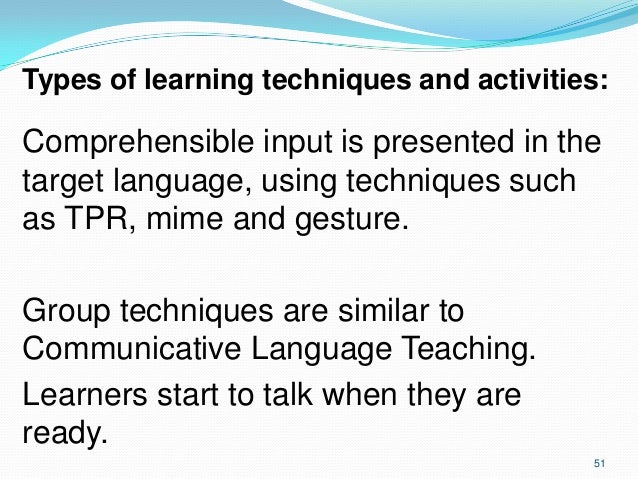Communicative Language Teaching Approach Activities For Seniors
Posted by admin- in Home -15/11/17Age, Motivation, and Theories of L2 Learning. There are several ways to learn an L2 and different opportunities and conditions for doing so. Learners differ with regard to, for example, aptitude for language learning, willingness to communicate, self confidence, level of anxiety, and cognitive ability. They also differ with regard to the age at which they start learning the L2, where they live, and the extent to which they are motivated for L2 learning. In this chapter, we address theories in second language acquisition, with an emphasis on those appearing after what has become known as the social turn Block, 2. L2 motivation theories. In addition, we discuss teacher empowerment, age effects in L2 learning, and the benefits and drawbacks of starting L2 teaching early. There is also a section on different forms of assessment, and assessment in relation to learner age. ProblemBased Learning and Adult English Language Learners. Julie MathewsAydinli Center for Adult English Language Acquisition CAELA April 2007. Title Length Color Rating The Problem Of Illiteracy What exactly is illiteracy. Is it this common theme within the community that places certain individuals. So, understanding that in many programs the literacylevel class may be quite diverse, the general information about teaching adult English language learners in FAQ. View Notes mgmt3720 from FINA 4310 at North Texas. Chapter 1 What Is Organizational Behavior MULTIPLE CHOICE 1. Successful managers and entrepreneurs recognize. What is Classroom Participation Participation usually means students speaking in class answer and ask questions, make comments, and join in discu. University of Georgia. Computer Science deals with the logical and mathematical foundations of computing and how to implement problem solutions as programs in a computer language. It continues to be one of the fastest growing career fields in the nation with critical demands for technically trained persons to provide technical support for computer operations and develop new computer hardware and software systems. The B. S. in Computer Science at the University of Georgia provides a strong foundation in computer science theory and practice and is accredited by the Computing Accreditation Commission of the Accreditation Board for Engineering and Technology ABET. The curriculum covers the design principles of key computing technologies such as hardware, operating systems, database systems, networks, graphics, and artificial intelligence. Mathematical reasoning is emphasized throughout the program. Students learn how to build a computer, make a computer do what is needed, verify these expectations, represent and report information, access data effectively, and solve computation problems systematically as quickly as possible. Increasingly, computer science is the driving force for advances and breakthroughs in multiple disciplines. The Computer Science laboratories and faculty at UGA maintain extensive collaborations with the faculty of Engineering, Bioinformatics, Life Sciences, Management and Business, and Artificial Intelligence and Cognitive Science departments on campus. Graduates work at some of the best computer and software development companies and research institutions in the world Google, Yahoo, Amazon, Microsoft, IBM, Oracle, SAP, BEA systems, Intel, Samsung, Siemens, Verizon, Telcordia Technologies Bellcore, Disney Animation, Lawrence Berkeley National Labs, National Library of Medicine, and Sandia National Labs. Career opportunities are also available in the communications industry, consulting firms, and a host of other areas. Students who obtain Ph. D. s have taken positions at universities and in industry research. Link to departments website. Interested in serving in the Air Force after graduationClick here for UGA ROTC details and scholarship opportunities. 

